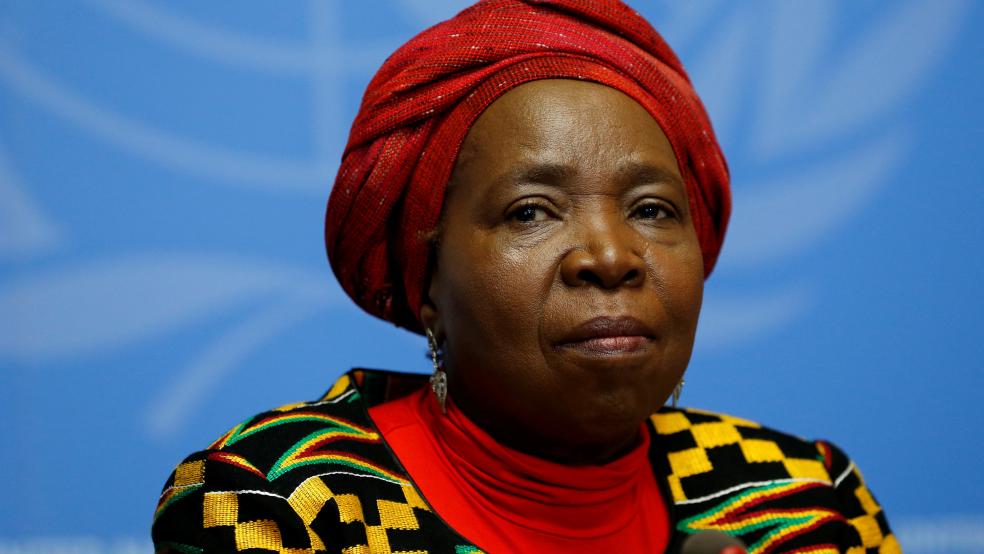JOHANNESBURG (Reuters) - Nkosazana Dlamini-Zuma is a fierce campaigner against racial inequality whose hostility to big business has rattled investors in South Africa. She is also one of two front runners to be the country's next president.
The 68-year-old is vying to succeed her ex-husband, President Jacob Zuma, as leader of the ruling African National Congress at a party vote this weekend, an outcome that would make her favorite for the presidency after a parliamentary election due in 2019.A medical doctor and former chair of the Commission of the African Union, a pan-continental grouping, Dlamini-Zuma has pledged during her campaign to "radically" tackle the racial inequality that persists in South Africa 23 years after the end of white minority rule.Backers of her main rival, Deputy President Cyril Ramaphosa, say she is peddling populist rhetoric and would rule in the mould of her former husband, whose decade in power has been plagued by corruption scandals. Dlamini-Zuma declined to be interviewed for this story.The choice between Dlamini-Zuma and Ramaphosa will influence South Africa's economic policy trajectory, as well the country's role in Africa and beyond.Graphic: ANC election in South Africa - http://fingfx.thomsonreuters.com/gfx/rngs/SAFRICA-POLITICS/010051Z44FX/S...Graphic: South African economy - http://fingfx.thomsonreuters.com/gfx/rngs/SAFRICA-ECONOMY/010051ZX4HL/in...Investors are worried by Dlamini-Zuma's hostility toward international companies, which she says form part of a "white monopoly capital" cabal dominating South Africa's wealth."A Dlamini-Zuma victory would signal a sharp rhetorical shift toward more leftist economic policy," said John Ashbourne, an Africa-focused economist at Capital Economics. "A further credit ratings downgrade would be almost inevitable."Yet Dlamini-Zuma's supporters point to a commitment to changing the lives of South Africa's black majority. Lynne Jones, a psychiatrist and author who lived with Dlamini-Zuma when they were students together in the English city of Bristol in the 1970s, says her determination to fight injustice is rooted in her own personal story.Jones remembers a day four decades ago when Dlamini-Zuma lay on her bed and wept after being forced to miss her brother's funeral because the apartheid-era security services had hounded her out of South Africa."She was fiercely intelligent and determined," said Jones."Here was someone who had put their whole life on the line and given up home and family for what they believed. It was eye-opening."AFRICAN NATIONALISTThe race between Ramaphosa, a unionist-turned-millionaire businessman, and Dlamini-Zuma is too close to call, political analysts say.Her campaign team told Reuters in written comments it was confident she would be elected ANC leader.Ramaphosa, who is popular among swathes of the ANC disillusioned with Zuma, is promising to end corruption, boost a flatlining economy and deliver jobs to the poor in a country where more than a quarter of the population is unemployed.Dlamini-Zuma, by contrast, is an African nationalist and has the support of the influential ANC youth and women's leagues, which both tend to support socialist policies.Known for her fierce temper and hostility toward the West, she was described in one 2001 U.S. diplomatic cable on WikiLeaks as a "truculent and petulant foreign minister".Another cable to Washington suggested she could be charming."Belying her reputation as fierce and formidable, the Minister was soft spoken and smiling in this meeting - articulate but gentle, candid but warm," Donald Gips, then U.S. ambassador to South Africa, wrote in 2010. The most common criticism of Dlamini-Zuma is that she is beholden to Zuma and his powerful patronage network. Zuma has publicly endorsed her."She is bold and you can't fool her. She is someone you can trust," Zuma told a rally recently. The couple met in Swaziland in the 1980s, when they were both in the ANC underground. They were married for more than a decade and have four children together.RELIANCE ON ZUMAIn a rare interview last month, Dlamini-Zuma challenged her opponents to find any evidence of corruption in her long political career."I don't loot government coffers. I've never done so, and I will not do so," she told ANN7 television.But for some senior figures in the ANC, she has not done enough to distance herself from the corruption scandals that have dogged President Zuma."She has not said anything on 'state capture'," ANC chief whip Jackson Mthembu told Reuters, using a South African term to describe private interests unduly controlling government funds.Dlamini-Zuma says accusations that she is piggy-backing off Zuma are "insulting" given her career, first as a doctor to ANC leaders fighting apartheid and then as a cabinet minister under every South African president since 1994.As health minister in Nelson Mandela's cabinet, she laid the foundations for free public healthcare for the poor, took a hard line on smoking and made medicines more accessible.As foreign minister she fostered friendships with African countries and emerging economies like China, even when this angered the West.But she also made errors of judgment.In 1996, Dlamini-Zuma awarded a contract for more than $3 million to a friend for a play, Sarafina II, to raise awareness about AIDS and was later found to have ignored tender rules. Political analyst Ralph Mathekga said that paled in comparison to recent government malpractice. He said: "14 million rand in the Sarafina scandal now seems like peanuts when compared with the looting under Zuma." (Editing by James Macharia and Giles Elgood)'Fierce and formidable' Dlamini-Zuma eyes South Africa's presidency

DENIS BALIBOUSE



